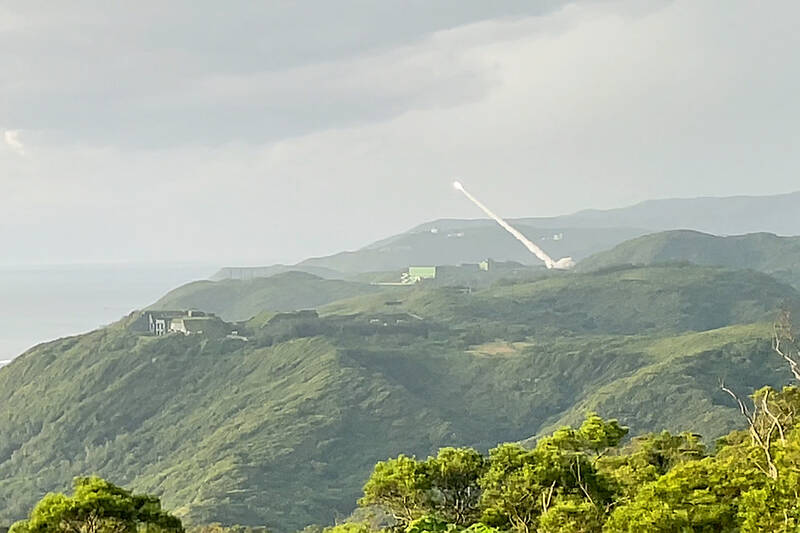Taiwan is to build 12 new indigenous Tien Kung or Sky Bow III (TK III) land-based surface-to-air missile sites by the end of 2026 to counter the threat of China’s ballistic missiles, according to a Ministry of National Defense (MND) report.
The report, sent to the Legislative Yuan on Oct. 20 for a defense budget review, said the new sites were needed based on the advice of Taiwan’s top military research unit, the Chungshan Institute of Science and Technology.
It said the institute has found that older generations of TK missiles it built, the TK IIs, could no longer counter the threat of the Chinese People’s Liberation Army’s advanced ballistic missile systems and needed to be modernized.

Photo: Tsai Tsung-hsien, Taipei Times
Consequently, the MND decided to upgrade its existing MIM-23 Hawk missile system sites and TK II missile sites and turn them into 12 new missile sites for the more advanced TK III land-based surface-to-air missiles, the report said.
It did not disclose how many TK III land-based surface-to-air missile sites Taiwan already has around the country.
The first phase of the project, the upgrading of six old missile sites into sites compatible with the TK IIIs, began last year and is expected to be completed before the end of 2025.
Work on the remaining six TK III missile sites began earlier this year and should be completed before the end of 2026, the MND said in the report.
According to the institute’s Web site, the TK III system is designed to engage different threats, including aircraft, cruise, anti-radiation and short-range tactical missiles.
The system can also launch older versions of missiles in the TK family, including TK I and II missiles.
The TK III system is being operated in conjunction with the US-bought PAC system as the backbone of Taiwan’s low-altitude air defense system, the institute said on its Web site.

Taiwan has received more than US$70 million in royalties as of the end of last year from developing the F-16V jet as countries worldwide purchase or upgrade to this popular model, government and military officials said on Saturday. Taiwan funded the development of the F-16V jet and ended up the sole investor as other countries withdrew from the program. Now the F-16V is increasingly popular and countries must pay Taiwan a percentage in royalties when they purchase new F-16V aircraft or upgrade older F-16 models. The next five years are expected to be the peak for these royalties, with Taiwan potentially earning

STAY IN YOUR LANE: As the US and Israel attack Iran, the ministry has warned China not to overstep by including Taiwanese citizens in its evacuation orders The Ministry of Foreign Affairs (MOFA) yesterday rebuked a statement by China’s embassy in Israel that it would evacuate Taiwanese holders of Chinese travel documents from Israel amid the latter’s escalating conflict with Iran. Tensions have risen across the Middle East in the wake of US and Israeli airstrikes on Iran beginning Saturday. China subsequently issued an evacuation notice for its citizens. In a news release, the Chinese embassy in Israel said holders of “Taiwan compatriot permits (台胞證)” issued to Taiwanese nationals by Chinese authorities for travel to China — could register for evacuation to Egypt. In Taipei, the ministry yesterday said Taiwan

‘LIKE-MINDED PARTNER’: Tako van Popta said it would be inappropriate to delay signing the deal with Taiwan because of China, adding he would promote the issue Canadian senators have stressed Taiwan’s importance for international trade and expressed enthusiasm for ensuring the Taiwan-Canada trade cooperation framework agreement is implemented this year. Representative to Canada Harry Tseng (曾厚仁) in an interview with the Central News Agency (CNA) said he was increasingly uneasy about Ottawa’s delays in signing the agreement, especially as Ottawa has warmed toward Beijing. There are “no negotiations left. Not only [is it] initialed, we have three versions of the text ready: English, French and Mandarin,” Tseng said. “That tells you how close we are to the final signature.” Tseng said that he hoped Canadian Prime Minister Mark Carney

POSITIVE DEVELOPMENT: Japan and the US are expected to hold in-depth discussions on Taiwan-related issues during the meeting next month, Japanese sources said The holding of a Japan-US leaders’ meeting ahead of US President Donald Trump’s visit to China is positive news for Taiwan, former Japan-Taiwan Exchange Association representative Hiroyasu Izumi said yesterday. After the Liberal Democratic Party’s landslide victory in Japan’s House of Representatives election, Japanese Prime Minister Sanae Takaichi is scheduled to visit the US next month, where she is to meet with Trump ahead of the US president’s planned visit to China from March 31 to April 2 for a meeting with Chinese President Xi Jinping (習近平). Japan and the US are expected to hold in-depth discussions on Taiwan-related issues during the